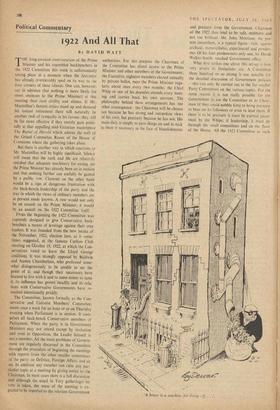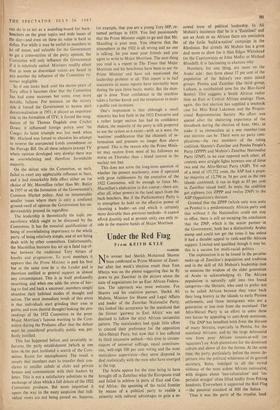Political Commentary
1922 And All That
By DAVID WATT
•
But there is another way in which reactions to Mr. Macmillan will be highly significant. Silence will mean that the rank and file are relatively satisfied that adequate machinery for easing out the.Prime Minister has already been set in motion and that nothing further can usefully be gained by a public row. Clamour on the other hand would be a, sign of dangerous frustration with the back-bench leadership of the party and the way in which the views of ordinary members arc at present made known. A row would not only be an assault on the Prime Minister; it would be an assault on the 1922 Committee itself.
From the beginning the 1922 Committee was expressly, designed to give Conservative back- benchers a means of leverage against their own leaders. It was founded from the new intake of the November, 1922, election (not, as is some- times suggested, at the famous Carlton Club meeting on detober 19, 1922, at which the Con- servatives voted to leave the Lloyd George coalition). It was strongly opposed by Baldwin and Austen Chamberlain, who professed some- what disingenuously to be unable to see the point of it; and though their successors have learned to live with it and to some extent to tame it, its influence has grown steadily and its rela7 tions with Conservative Governments have re- mained intentionally prickly.
The Committee, known formally as the Con- servative and Unionist Members' Committee, meets once a week for' an hour or so on Thursday evening when Parliament is in session. It com- prises all back-bench Conservative members of Parliament. When the party is in Government Ministers may not attend except by invitation and even in Opposition, the Leader himself is not a member. All the main problems of Govern- ment are regularly discussed in the Committee through the procedure of beginning the meetings with reports from the other smaller committees of the party on Defence, Foreign Affairs and so on. In addition any member can raise any par- ticular topic at a meeting by giving notice to the Chairman. In most cases there is a full discussion and although (as usual in Tory gatherings) no vote is taken, the sense of the meeting is ex- pected to be reported to the relevant Government authorities. For this purpose the Chairman of the Committee has direct access to the Prime Minister and other members of the Government; the Executive, eighteen members elected annually by private ballot, meet the Prime Minister regu- larly about once every two months; the Chief Whip or one of his deputies attends every meet- ing and carries back his own account. The philosophy behind these arrangement's has one other consequence: the Chairman will be chosen not because he has strong and outspoken views of his own, but precisely because he has not. His main duty is simply to pass things on and to stick to them if necessary in the face of blandishments and pressure from the Government. Chairmen of the 1922. thus tend to be safe, stubborn and not too brilliant. Mr. John Morrison, the pre- sent incumbent, is a typical figure—rich. squire- archical, monosyllabic, experienced and ponder- ous. Of his four predecessors only one, Sir Derek Walker-Smith. reached Government office.
What first strikes one about this set-up is how very severe its limitations are. A Committee three hundred or so strong is not suitable for the detailed discussion of Government polic;,- ----this can only be carried out in the far smaller Party Committees on the ,various topics. For the same reason it is not really possible for the Government to use the Committee or its Chair- man (if they could. nobble him) to bring pressure to bear on its followers or even to lead them. If there is to be pressure it must be exerted piece- meal by the Whips; if leadership, it must Ix through the small committees and on the floor of the House. All the 1922 Committee as such 'A house is a machine for of/. . can do is to act as a sounding-board for back- benchers on the great topics and wide issues of the day—and.even on these its value is hard to define. For while it may be useful to members to let off steam, and valuable for the Government to get a cross-section of the party opinion, the Committee will only influence the Government if it is relatively united. Ministers readily admit that as soon as discordant voices are heard in any number the influence of the Committee te- comes negligible.
So if one looks back over the eleven years of Tory office it becomes clear that the Committee has had some successes but some, even more notable, failures. For instance, on the victory side it forced the Government to hasten steel denationalisation in 1951; it played an important role in the formation of ITV; it forced the resig- nation of Sir Thomas Dugdale over Crichel Down; it influenced foreign policy over the Congo; its latest triumph was last week when Mr. Macleod was forced to abandon his attempt to reverse the unexpected Lords amendment on the Peerage Bill. On all these subjects (except TV where opinion developed very slowly) there was an overwhelming and therefore formidable majority.
On the defeat side the Committee, as such, failed to exert any appreciable influence at Suez, and it had remarkably little effect either on the choice of Mr. Macmillan rather than Mr. Butler in 1957 or on the formation of the Government's Common Market policy. And on innumerable smaller issues where there is only a confused ground-swell of opinion the Government has un- derstandably pressed on regardless The leadership is theoretically the topic par excellence which ought to be discussed by the Committee. It has the essential qualifications of being of overwhelming importance to the whole party, of being relatively simple, and of not being dealt with by other committees. Unfortunately, the Macmillan business has set up a fatal tug-of- war between the traditional Tory virtues of loyalty and pragmatism. To most members it appears that the Prime Minister is past his best but at the same time he is the Leader and is therefore .entitled to general support in almost any circumstances. This is in itself profoundly unsettling, and when one adds the stress of hav- ing to find and back a successor, members simply abandon their habitual modes of thought and action. The most immediate result of this stress is that individuals start grinding their axes in public and even (horrid thought) leaking the pro- ceedings of the 1922 Committee to the press Major Morrison's famous warning to the Com- mittee during the Profumo affair that the debate must be considered practically public was per- fectly justified.
This has happened before and invariably in- furiates the party establishment (which at one time in the past instituted a search of the Com- mittee Room for microphones). The result is simply that members start to transfer their con- claves to smaller cabals at clubs and private houses and communicate with their leaders by letter. This is not a satisfactory substitute to the exchange of ideas which a full debate of the 1922 Committee produces. But more important it opens the way to the nasty suspicion that indi- vidual views are not being passed on. Suppose, for example, that you are a young Tory MP, re- turned perhaps in 1959. You feel passionately that the Prime Minister ought to go and that Mr.
Maudling is your man. You observe that the atmosphere in the 1922 is all wrong and no one is talking. So you meet your friends and you
agree to write to Major Morrison. The next thing you read is a report in The Times that Major Morrison and his henchmen have been to see the Prime Minister and have not mentioned the leadership problem at all. This report is in fact inaccurate as many reports have inevitably been during the past three hectic weeks. But the dam- age is done. Your confidence in the machine takes a further knock and the temptation to make a public row increases.
One's impression is that although a small minority has lost faith in the 1922 Executive and a rather larger section has had its confidence shaken, the majority of the party is still prepared to use the system as it exists—with as it were, the 'wartime' modification that the channels of in- formation and pressure no longer flow above ground. This is the reason why the Prime Minis- ter may receive from most of his followers no worse on Thursday than i bland interest in the nuclear test ban This does not solve the long-term question of whether the present machinery, even if operated with great ruthlessness by the executive of the 1922 Committee, will be enough to force Mr. Macmillan's abdication in due course—there are, after all, other powers in the land apart from the back-benchers. But if the Parliamentary Party is to strengthen its hold on the effective power of choosing a leader-r—an end which is certainly more desirable than previous' methods—it cannot afford disunity and at present unity can only re- side in the massive hands of Major Morrison.







































 Previous page
Previous page